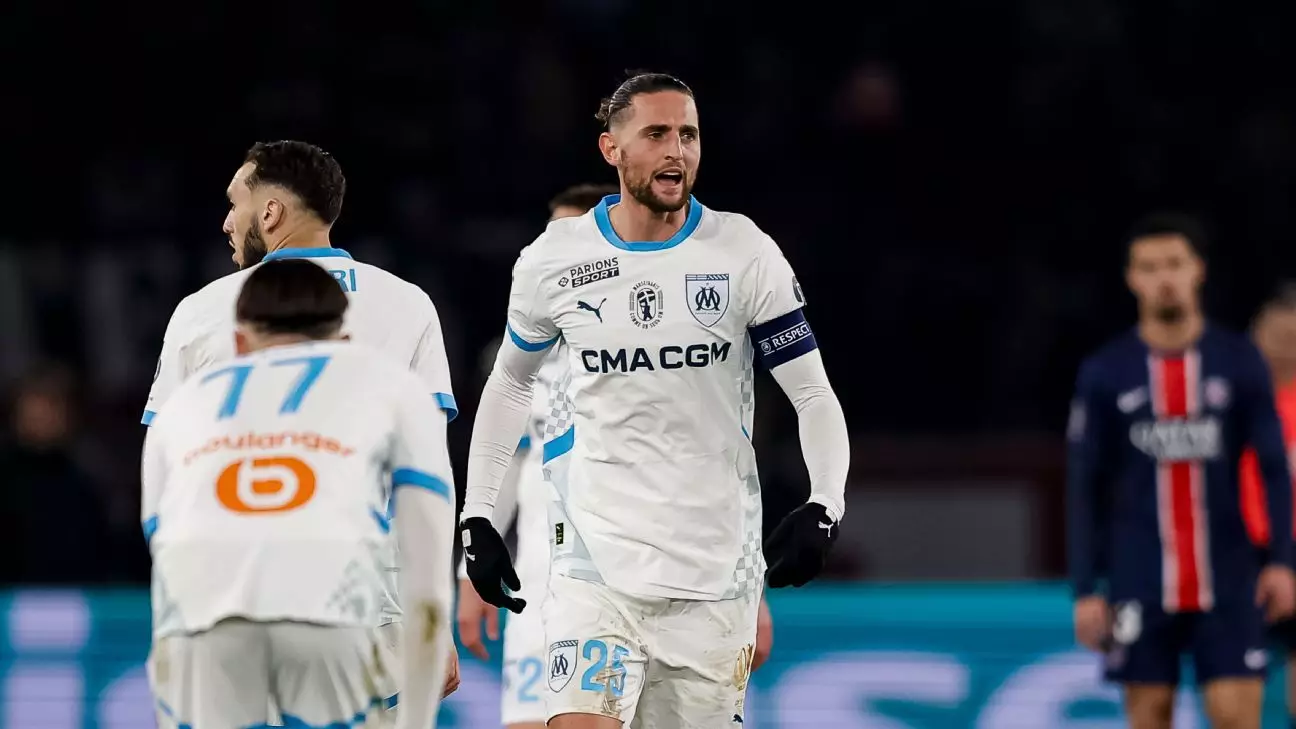In a world where sports should represent unity, passion, and the unadulterated love for a game, the recent clash between Marseille and Paris Saint-Germain (PSG) took a disheartening turn. Following the 3-1 defeat of Marseille at PSG’s Parc des Princes, midfielder Adrien Rabiot publicly criticized PSG president Nasser Al-Khelaifi, launching a social media tirade that resonated with fans and critics alike. “You can’t buy class,” Rabiot posted, highlighting a grim reality in modern football where wealth often overshadows values.
The match itself was marred by toxic behavior, particularly from PSG supporters who resorted to anti-gay chants and racist insults. Rabiot faced hostility upon returning to his former club, where he initially played over 200 games from 2012 to 2019. His transition to Marseille, branded a betrayal by PSG’s faction of fans, only intensified the vitriol directed towards him. Rabiot’s creative prowess on the field stands juxtaposed against a backdrop of ugliness, asking we question whether any amount of money can redeem such vile conduct.
The Personal Toll of Professional Rivalry
Rabiot’s experience underscores a broader anxiety that professional athletes face—how deeply personal the sport can become, bridging the gaps between competition and outright animosity. Following the match, Rabiot didn’t shy away from sharing his feelings in the online sphere. “Insulting a mother, and a dead father…” he lamented, encapsulating the visceral pain of personal attacks. This pain extends beyond individual to collective responsibility; fans wield words like weapons, often enacting psychological harm on players and their families.
The vitriol extended towards Rabiot’s mother, Véronique, also his agent, has sparked outrage and demands for accountability. She stated that she intends to lodge a complaint, questioning why the match officials didn’t intervene amid hostile chanting. The discrepancy in sanctioning such behavior raises critical questions about the integrity of football’s governing bodies and their commitment to safeguarding players against the toxicity rampant among some fan bases.
Football’s Dark Reality: A Call for Change
Rabiot’s statements are a clarion call reverberating through the stadiums and social media feeds, yet their impact hinges upon action beyond words. Campaign organizations like Rouge Direct have passionately rallied for legislative action against discriminatory behavior, urging government officials and league organizers to impose stricter sanctions on hate speech. The social media-era fans, armed with the ability to document misconduct instantly, can amplify these calls, making it increasingly challenging for governing bodies to ignore the rising tension.
The non-intervention by referee Clément Turpin, one of Europe’s reputed officials, is perplexing in a climate where racial and homophobic slurs have long been tolerated. French football laws enable match stoppages in cases of discriminatory chanting, so the insistent crowds create a paradox of authority and accountability, wherein passive spectatorship becomes a choice—an option that should not exist. It begs reflection on the mechanism of accountability; should not a game, often perceived as a sanctuary of fair play, become a fortress against hate?
The Broader Implications for French Football
The consequences of inaction extend far beyond a single match or individual player; they question the future fabric of football itself. With horror, fans witnessed how discriminatory chants have become normalized at various stadiums, impeding the game’s supposed unifying spirit while perpetuating a culture of fear among opposing supporters and minority groups. French football has seemingly oscillated between reactive measures—like fines and stadium closures—and a more profound systemic overhaul.
While PSG has previously faced sanctions for homophobic chanting, the recent incidents, including the chant that likened Marseille to “rats,” offer a grim reminder of how deeply entrenched these issues are within the sport. The denigrating implications of such chants serve not just as a display of rivalry but as a troubling commentary on societal issues that need urgent address.
Each match is not merely a contest of athletic skill; it is a reflection of cultural attitudes that require our collective introspection. As Rabiot boldly advocates for respect over revenue, one can only hope that the echoes of his words will catalyze meaningful change in the hearts and minds of football fans and beyond.


Leave a Reply